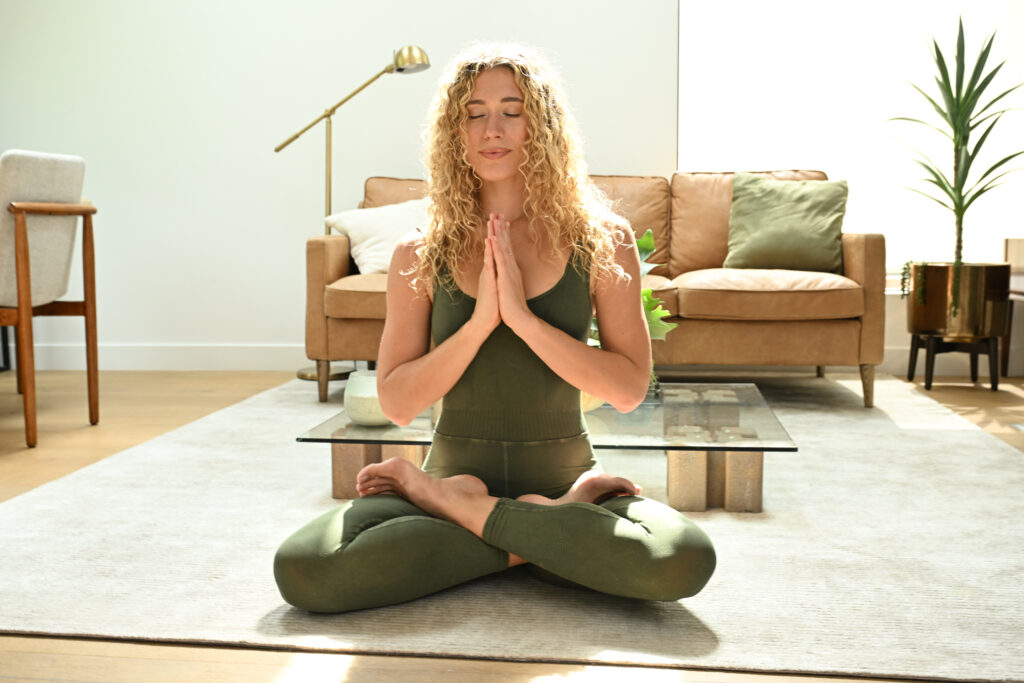Finding Peace in the Present Moment: How Yoga Can Help Manage Anxiety

In today’s fast-paced world, anxiety has become a widespread issue affecting many people. The constant pressure of keeping up with daily life can leave us feeling stressed, overwhelmed, and restless. However, amidst this chaos, there is a powerful tool that can help us find solace and calmness – yoga. A consistent yoga practice is the remedy to ease feelings of distress and anxious behavior. By incorporating doable practices into our daily routine, such as prioritizing time on the mat, practicing breathing exercises, and following the ancient philosophy of yoga, we can effectively manage and even heal anxiety. Because yoga emphasizes living in the present moment, it cantering peace to the mind and is capable of shifting the dynamics of one’s life from one of dis-ease to ease.
When it comes to combating anxiety, certain types of types of yoga asana can provide significant benefits. Gentle or Restorative yoga practices focus on slow and deliberate movements, allowing the body to relax and release tension. These classes often incorporate props such as bolsters and blankets, assisting students in holding poses for an extended period, promoting deep relaxation and letting go of tension stored in the body. Another helpful type of yoga class for reducing anxiety is Yin yoga. This practice involves holding poses for longer durations, targeting the deep connective tissues of the body. The slow and mindful nature of Yin yoga helps calm the nervous system, fostering a greater sense of peace and tranquility. A Hatha-styled practice offers a balance of longer-held postures with some movement, providing calmness within the postures while also promoting release and energetic flow. Even a Vinyasa-flow styled practice can provide movement and an opportunity to focus on the breath, helping reclaim a clear mind and energetically lighter body. When choosing a specific type of class, it’s important to check in and consider what you truly need, honoring that. A Restorative or Yin practice may be better suited for busy days of non-stop activity, while a Hatha or Vinyasa practice can be beneficial after sedentary periods or when overwhelmed by screen time.
One of the fundamental aspects of yoga is conscious breathing. By practicing specific breathing exercises, we can activate the body’s relaxation response and soothe the anxious mind. One such exercise is “4-7-8” breathing, inhaling for a count of 4, holding the breath for 7 counts, and exhaling for 8 counts. This technique regulates the nervous system, promoting calmness and balance. Another powerful breathing exercise is alternate nostril breathing, also known as Nadi Shodhana. This technique involves using the thumb and ring finger to alternate nostrils while breathing, balancing the brain’s left and right sides, reducing anxiety, and promoting mental clarity. There are many different pranayama techniques that can calm the mind, but it’s important to approach them slowly, especially if you’re not used to breathwork. Working with a breathwork teacher for support and guidance is highly recommended. Simply slowing down and observing your breath can soothe anxiety, especially focusing on the exhale pattern to release and let go of busyness and anxiety held within.
Another aspect of the yoga practice that helps ease anxious tendencies is the ancient text of yoga known as the Yoga Sutras. It offers valuable insights and guidance for managing anxiety. One of the key teachings is the concept of “Sthira Sukham Asanam,” which translates to “steady and comfortable pose.” This principle encourages practitioners to find a balance between effort and ease in their yoga practice. By applying this philosophy to life off the mat, we can navigate challenging situations with calmness and resilience. Additionally, the Yoga Sutras highlight the importance of practicing mindfulness and living in the present moment. Anxiety often stems from excessive worry about the future or ruminating over past events. Yoga teaches us to anchor our awareness in the present moment, where true peace can be found. The very first Yoga Sutra, Atha Yoga-Anuśāsanam translates to “Now, the teachings of yoga.” and reminds us that now is the time for us, bringing us back to the present moment and encouraging our presence and attention, leading us away from future projections or past fears and pain. Bringing the philosophy of yoga into our daily life helps us live in a higher vibration, rather than the often low vibration state where anxiety, fear, and worry tend to reside.
Anxiety is often characterized by a restless and chaotic mind, constantly fluctuating between worries and fears. Yoga, with its focus on breath, movement, and mindfulness, offers a path to stillness and tranquility by quieting these fluctuations. By practicing yoga, we learn to observe and detach from our thoughts, allowing them to settle and creating space for a sense of calmness to emerge. In a world filled with constant distractions and pressures, finding peace and healing from anxiety can seem challenging. However, yoga and its many limbs offer a path to tranquility by emphasizing the importance of living in the present moment. By making time for a consistent yoga practice, working with the breath to clear the mind, and embracing the teachings of the Yoga Sutras, we can harness the power of yoga to truly heal anxiety. So, study, live, and breathe your yoga and allow yoga to move you out of anxiety and into a space where you can find daily solace and peace becomes your constant companion.
Yoga is a powerful tool for managing anxiety by promoting a mind-body connection. It involves exercises that focus on breathing, stretching, and relaxation, soothing an overactive nervous system. Through meditation, visualization, and breath awareness, yoga helps individuals let go of worry and fear, fostering mental and physical relaxation. Research suggests that regular yoga practice can reduce stress and anxiety, offering holistic benefits for mental well-being.